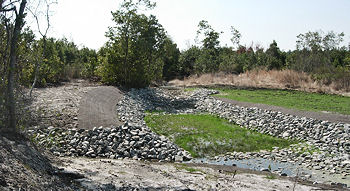 Each year, property owners in North Carolina undertake projects that affect the nation's aquatic resources, which includes rivers, wetlands, streams, lakes, sounds and waters in and offshore North Carolina. Before property owners may proceed with work that may impact the function and quality of the waters, a permit from the US Army Corps of Engineers is often required to meet the requirements of the Clean Water Act or the Rivers and Harbors Act. Through the regulatory program, the Corps of Engineers ensures that all associated adverse environmental impacts from work in waters or wetlands are avoided or minimized. In some cases, the Corps may require compensatory mitigation to offset losses of aquatic resources.
Each year, property owners in North Carolina undertake projects that affect the nation's aquatic resources, which includes rivers, wetlands, streams, lakes, sounds and waters in and offshore North Carolina. Before property owners may proceed with work that may impact the function and quality of the waters, a permit from the US Army Corps of Engineers is often required to meet the requirements of the Clean Water Act or the Rivers and Harbors Act. Through the regulatory program, the Corps of Engineers ensures that all associated adverse environmental impacts from work in waters or wetlands are avoided or minimized. In some cases, the Corps may require compensatory mitigation to offset losses of aquatic resources.
What Is Compensatory Mitigation?
Compensatory mitigation is the restoration, establishment, enhancement, or preservation of aquatic resources for the purpose of offsetting losses of aquatic resources resulting from activities authorized by Corps of Engineers' permits.
| Restoration |
Returns natural or historic functions to a former or degraded aquatic environment |
| Establishment |
Alters an upland site to develop an aquatic resource |
| Enhancement |
Improves the functioning of an existing aquatic resource |
| Preservation |
Protects and maintains an existing aquatic resource through real estate protections or other conservation actions |